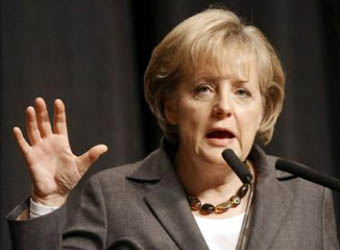Chancellor Angela Merkel’s coalition plans face a make-or-break vote this weekend as the Social Democrats decide whether to help usher in her fourth term or walk away from government and risk pushing Europe’s biggest economy further into political uncertainty.
Germany’s oldest political party is split over its future direction, and those divisions will play out at a national convention on Sunday in Bonn, where delegates are set to vote on whether to move forward on another government with Merkel or go into opposition.
Investors are bracing for the outcome, with the euro forecast to drop if the SPD bows out. A “No” vote would rob Merkel of coalition options and force her to choose between a minority government or a repeat election.
Social Democratic Party head Martin Schulz, lawmakers and key labor chiefs lobbied the 600 delegates over the past week to back the leadership’s proposal to begin formal coalition talks, saying the party can achieve more if it stays in government. Kurt Beck, a former SPD chairman, said he expects the plan to pass with about 60 percent of the vote.
“The party is very divided, like many Social Democratic parties across Europe,” Guntram Wolff, director of the Brussels-based Bruegel research group, said in an interview, predicting a “very tight” vote. Berenberg economist Holger Schmieding said there’s a “better than even chance” of SPD backing.
Merkel and Macron
On the table is a 28-page policy outline agreed by the two sides in a marathon session on Jan. 12. SPD delegates must decide if it’s a sufficient basis on which to forge a common platform for government, even though many of them blame the party’s role as Merkel’s junior partner over the past four years for its electoral decline to a post-World War II low.
A vote in favor would signal that Germany’s political center is holding and point toward an exit from a deadlock that’s held up policy-making in Europe. Merkel is already returning to the world stage, visiting French President Emmanuel Macron on Friday and scheduling her first speech in three years to the World Economic Forum in Davos, Switzerland, for Wednesday.
“Of course I’d like to see the SPD convention give the green light for entering into coalition negotiations,” Merkel said alongside Macron in Paris. “I see a broad common foundation in terms of engaging on Europe. To do that, a stable government is required.”
Merkel and the Social Democrats have governed together for eight of her 12 years in office, united by a pro-European stance that’s reflected in last week’s preliminary deal. Even if efforts to set up a formal coalition pact fail and lawmakers elect Merkel chancellor of a minority government, she could broadly count on SPD and Green party support for her European agenda.
‘Another Way’
Former Finance Minister Wolfgang Schaeuble, a Merkel party ally, said a “grand coalition” is the preferred option but not the only way, according to an interview with Die Welt newspaper. “If it doesn’t succeed, it’s not a catastrophe,” he was quoted saying. “Then there’s another way.”
It’s Merkel’s second attempt to form a government after her party won an inconclusive federal election in September. Even if the SPD vote goes her way, the party would still put any coalition pact to a ballot by its more than 400,000 members.
Merkel, 63, remains popular with the voting public, with 54 percent in favor of her serving another term, according to a Jan. 16-18 FG Wahlen poll published Friday. Yet surveys also suggest her struggle to build a government and the prospect of another grand coalition of the two biggest parties is diminishing her standing.
“The message of this government would not be one of a new beginning, but one of pragmatism and responsibility,” said Josef Janning, senior policy fellow at the European Council on Foreign Relations. “This grand coalition will symbolize the beginning of the end of one era, rather than the launch of a new one.”
Source: Bloomberg


